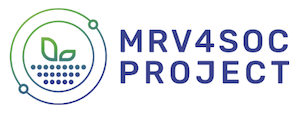MRV4SOC, Monitoring, Reporting and Verification of Soil Organic Carbon and greenhouse gas balance
 Project funded by the European Union’s Horizon 2020 Research and Innovation Programme
Project funded by the European Union’s Horizon 2020 Research and Innovation ProgrammeGrant Agreement n. 101112754
Duration: 36 months
Start date: 01/06/2023
The project official website
Soil can store more carbon from the atmosphere than it emits, acting as a sink. Unfortunately, climate change and socio-economic pressures have contributed to land degradation and a loss of biomass, ultimately reducing its sink capability. The result is a rise in atmospheric greenhouse gas concentrations and risks for food production. Sustainable land management practices can turn carbon sources into carbon sinks.
MRV4SOC aims to account for changes in as many Carbon pools as possible, estimate Green House Gases (GHG) and full Carbon budgets, couple Carbon and Nitrogen cycles, quantify Soil Organic Carbon (SOC) accumulation, and assess the results of traditional management practices and Carbon farming. The results of this project will contribute building a Monitoring, Reporting, and Verification framework for the EU land sector.
In view of its aim, MRV4SOC has the following specific objectives: measure long-term soil organic carbon accumulation in 9 EU representative land use/land cover classes; assess how carbon farming practices drive carbon flux dynamics in the 9 classes; evaluate the impact of climate change on soil organic carbon accumulation; develop a robust, transparent, standard, and cost-effective monitoring, reporting, and verification system to facilitate results-based payments associated with farming practices; identify revenue opportunities to unlock results-based payments; Increase stakeholders’ trust in voluntary carbon market.
The MRV4SOC consortium consists of 21 partners, led by the GMV Aerospace and Defence SA, from 8 European countries and 2 associated countries. Within this project, K&I is leading T1.2, which focuses on the monitoring and assessment of key “research ethics, gender, legal and societal aspects”, and T4.1, which aims to map hindering and enabling factors shaping the adoption of carbon farming practices by farmers and relevant stakeholders.
